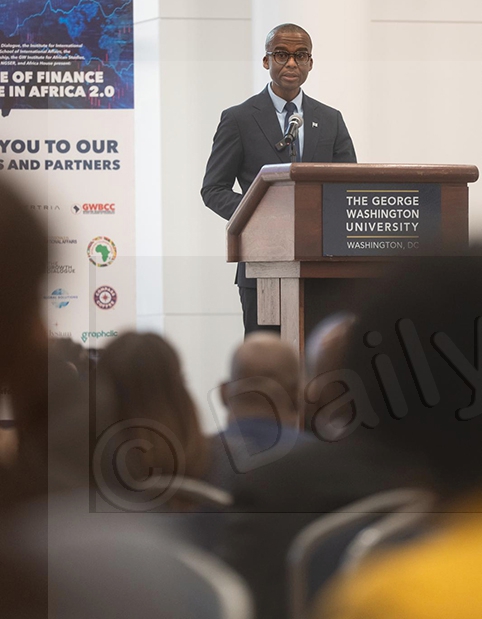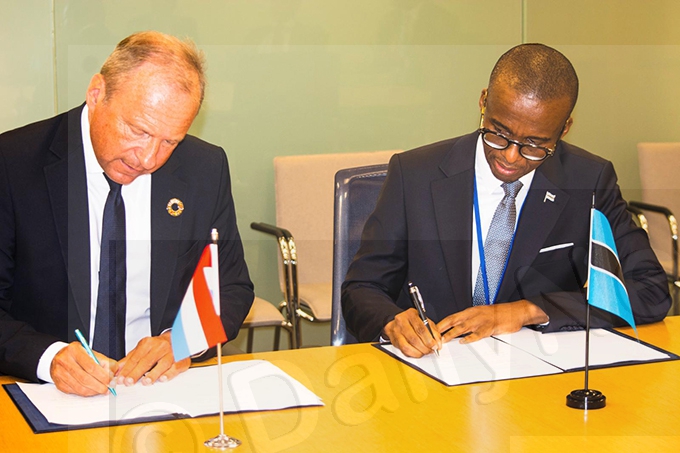Change of government highlights historic 2024
19 Dec 2024
In a surreal moment, barely a day and half after casting their votes in the 2024 general elections, Batswana on the morning of Friday November 1, watched and listened attentively to the then President Dr Mokgweetsi Masisi concede electoral defeat to Advocate Duma Boko.
The Botswana Democratic Party (BDP), led into this year’s polls by Dr Masisi, had always dominated domestic party politics from its inception in the 1960s, winning the first 12 general elections from 1965 to 2019.
The party of the nation’s first five presidents - Dr Masisi and his predecessors Sir Seretse Khama, Sir Ketumile Masire, Dr Festus Mogae and Lt Gen. Ian Khama - the BDP had been so dominant to an extent of appearing unshakable in the collective national psyche; the thought of a different governing party had become an obscure thought to many. Yet, the October 30 general elections presented the country with the historic change of government with the official opposition Umbrella for Democratic Change (UDC) assuming state power.
The electoral victory of UDC, a coalition of BDP’s historic rivals the Botswana National Front (BNF) and Botswana Peoples Party (BPP), alongside Alliance for Progressives (AP) founded largely by former BDP young turks, changed the Botswana political landscape.
The lead dramatis personae of Botswana Anno Domini 2024, Dr Masisi and Advocate Boko expressed mutual respect during the official handover of the Office of the President on November 4, barely a week after being the chief protagonists of a hotly contested poll.
BOPA Head of Photography and Chief Presidential Photographer Yobe Shonga noticed that after Dr Masisi showed Advocate Boko around the Office of the President, he walked the flight of stairs downstairs, instead of taking the presidential elevator he had been accustomed to since April 1, 2018; a magnanimous sign of respect that the levers of power were now the purvey of the new man in charge. This seamless transition into what the incoming Vice President Mr Ndaba Gaolathe called ‘the New Botswana’ concluded an eventful year in politics.
The year began with the Independent Electoral Commission (IEC) having won a Court of Appeal judgment that thwarted the UDC’s attempt to have its representatives monitoring voter registration and the voter’s roll compilation processes. Voter registration, which had been delayed by the court case, began in earnest early in the year, and a high turnover of eligible voters participated.
The nation was struck by tragedy on March 28, when St Engenas Zion Christian Church (ZCC) members from Molepolole travelling to Moria, Limpopo, South Africa for Easter pilgrimage perished as their bus fell off a ridge, killing 45 people at Mmamatlakala, approximately 100 km from Polokwane.
The Mmamatlakala bus tragedy engulfed the nation in sorrow as only an eight-year-old survived, leading to a mass funeral on May 4 in Molepolole, after a month long exhaustive process of corpses being identified, sorted and transported to their loved ones. Early in the year, the country was also grappling with European states proposing legislation to ban the importation of hunting trophies.
In March, the then Minister of Environment and Tourism, Mr Dumezweni Mthimkhulu, led a delegation that included Batawana Paramount Chief, Kgosi Tawana II, dikgosi of various villages next to wildlife areas, community trust representatives and ministry officials to London, United Kingdom.
There, Mr Mthimkhulu and his delegation lobbied British parliamentarians and other stakeholders against the UK’s Hunting Trophies (Importation) Bill. Botswana’s position, was that the bill, while intended to foster conservation, would lead to an increase in wildlife, in particular elephant population overwhelming the biodiversity, engender human-wildlife conflict and compromise the livelihood of communities living in wildlife areas who earn funds from hunting concessions. Botswana articulated that it has the world’s largest herd of elephants, over 130 000, owing to its good conservation practices. As such, the quota of 400 hunting licences offered per species does not place the animals at risk of extinction, and those species with smaller populations such as rhinos are already protected from hunting.
The quest to lobby this position took Mr Mthimkhulu and his delegation to several other European states after the initial London visit, and the elephant story caught global attention after a mock threat first by the minister and later by then President Masisi to deliver thousands of elephants to Hyde Park, London and to Germany so the Europeans could fully comprehend human-wildlife conflict.
The 2024-25 national budget, delivered in Parliament in February by the then Minister of Finance, Ms Peggy Serame, signaled the end of the two year Transitional National Development Plan (TNDP), a bridge between the eleventh National Development Plan (NDP 11), which ended in 2023, and the twelfth (NDP 12) due to commence in 2025.
Over P20 billion was injected into water supply, distribution and sanitation; road and rail transport, as well as research and innovation. To support the informal sector, Chema Chema, a revolving fund with a capital injection of P500 million was launched while Temo Letlotlo and Thuo Letlotlo agricultural schemes were also introduced.
In the final half of the year, a flurry of groundbreaking ceremonies for various infrastructural projects were conducted, ostensibly owing to overdue projects having been delayed by the COVID-19 pandemic. But critics derided this exercise as an election campaign ploy.
On September 4, after a three-year constitutional review exercise, the National Assembly voted to reject the Constitutional Amendment Bill of 2024 at its third reading as it lacked the necessary two-thirds majority vote.
A bill proposed by the then Minister for State President Mr Kabo Morwaeng to amend the Presidential (Pensions and Retirements) Benefits Act, to among others include presidential spouses and dependent children among beneficiaries, drew public ire and was withdrawn from the final session of the past Parliament. In early September, former President Lieutenant General Ian Khama returned to the country, after three years of self-imposed exile in South Africa and eSwatini, appearing to face charges of owning illegally registered firearms.
Charges against Lt Gen. Khama were dropped, and ahead of the October 30 polls, he actively campaigned for the Botswana Patriotic Front (BPF), which he served as patron.
Thereafter, former President Khama withdrew from party politics and on November 30 finally assumed duty as the Paramount Chief of the Bangwato under his royal title Kgosi Khama IV, in a ceremony held at the tribal capital Serowe.
He had been crowned in 1979, but left others in charge of the kgotla as he served national government duties, first at the Botswana Defence Force (BDF) and then in politics.
The Paramount Chief of the Bakgatla ba ga Kgafela, Kgosi Kgafela III in December also announced that he would be returning to the country in May, after 13 years of his own self-imposed exile to Moruleng, the tribal capital of the Bakgatla ba ga Kgafela of the Pilanesberg area of North West, South Africa. After illness, Minister Mthimkhulu died on September 2, while the governing party chief whip for the 12th Parliament, Mr Liakay Kablay also died a month later, on October 2.
The October 30 general elections produced a major surprise. While most political commentators having read the public mood predicted a hung parliament, the comprehensive victory of the UDC was unexpected by many.
The UDC gained 36 Members of Parliament, the Botswana Congress Party (BCP) 15, the BPF five seats and the BDP just four. Once in government, President Boko promised to govern guided by human rights, to ensure political freedoms such as basic civil liberties, as well as economic, social and cultural rights.
On International Human Rights Day, December 10, President Boko led a delegation to the Central Kalahari Game Reserve (CKGR) to bury Mr Pitseng Gaboberekwe, whose family had fought a bitter battle with government to lay to rest their loved one in their ancestral land since he died three years back. It set the tone for the new government as a year of historic change drew to a close. ENDS
Source : BOPA
Author : Pako Lebanna
Location : Gaborone
Event : Interview
Date : 19 Dec 2024






